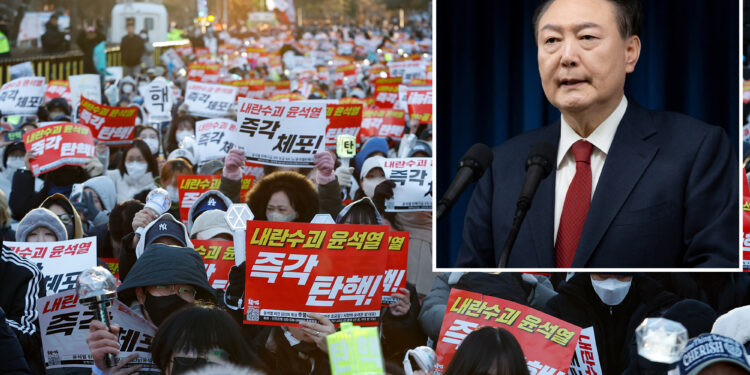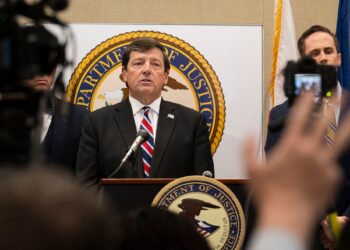
SEOUL — South Korea’s leadership crisis deepened on Sunday as prosecutors named President Yoon Suk Yeol as a subject of a criminal investigation over last week’s martial law attempt, a media report said, and his former defense minister was arrested.
Yoon survived an impeachment vote in the opposition-led parliament late on Saturday, prompted by his short-lived attempt to impose martial law on Tuesday, but the leader of his own party said the president would effectively be excluded from his duties before eventually stepping down.
That proposal, which appeared to win tacit approval from the Yoon-appointed prime minister on Sunday, drew condemnation from opposition lawmakers who said it was another unconstitutional power grab to delegate authority without resignation or impeachment.
Thousands of people rallied in front of the parliament in Seoul on Sunday, calling for the impeachment and arrest of Yoon and the disbandment of his ruling party.
Yoon’s martial law declaration on Tuesday plunged Asia’s fourth-largest economy and a key US military ally into its greatest political crisis in decades, threatening to shatter South Korea’s reputation as a democratic success story.
The leader of Yoon’s People Power Party, Han Dong-hoon, told a press conference alongside the prime minister on Sunday that Yoon would not be involved in foreign and other state affairs before his early resignation.
But National Assembly speaker Woo Won-shik said it was unconstitutional to delegate presidential authority to the prime minister and the ruling party without impeachment. Woo proposed a meeting of rival parties to discuss ways to suspend Yoon’s presidential power immediately.
The main opposition Democratic Party called for the immediate suspension of Yoon’s presidential duties and for stripping him of authority to control the military. The DP called for the arrest of Yoon and related military officials implicated in the martial law fiasco.
Yoon shocked the nation on Tuesday night when he gave the military sweeping emergency powers to root out what he called “anti-state forces” and obstructionist political opponents. He rescinded the order six hours later, after parliament defied military and police cordons to vote unanimously against the decree.
Criminal probe
Yonhap news agency reported that prosecutors had “booked” Yoon, a process in South Korea that involves formally naming subjects of investigation.
Prosecutors could not immediately be reached for comment on the report.
Three minority opposition parties filed a complaint with the prosecution against Yoon, ex-Defense Minister Kim Yong-hyun and martial law commander Park An-su, accusing them of insurrection. The crime of leading an insurrection is punishable by death or life imprisonment, with or without prison labor.
Kim, who stepped down on Wednesday after Yoon rescinded martial law, was seen as a central figure in the debacle. He had proposed martial law to the president, according to a senior military official and the impeachment filings.
The prosecution’s special investigative team arrested Kim on Sunday and seized his mobile phone, it said in a brief statement to reporters. Before the arrest, investigators questioned Kim, who voluntarily appeared at the Seoul Central District Prosecutors’ Office around 1:30 a.m. on Sunday (local time), Yonhap news agency reported.
The national police raided Kim’s office on Sunday as part of an investigation into claims of treason against Yoon and top ministers, Yonhap said.
Opposition lawmakers allege Yoon mobilized military forces to block a vote by lawmakers seeking to nullify what they said was an unconstitutional martial law decree.
Military crisis
Hours before Saturday’s impeachment vote, Yoon addressed the nation in a televised speech to apologize for his martial law decree, saying he would put his fate in the hands of his party.
Han said the comments were effectively a promise to leave office early, adding that the ruling party would consult with the prime minister to manage state affairs.
Prime Minister Han Duck-soo said on Sunday the cabinet would do its best to “maintain trust with our allies”, referring to the United States and Japan.
The ruling party offered few details on their plan to prevent Yoon’s impeachment but have him give up power, and the proposal added more confusion to the crisis over presidential authority.
In an effort to reassure the public, multiple military leaders, including the acting defence minister, have stated they would refuse any orders to impose another round of martial law.
The defense ministry did not respond to repeated questions from foreign media on Sunday over who is now the commander-in-chief of South Korea’s military, which is one of the largest in the world and operates combined commands with the United States.
“I think (military commanders) are very disappointed, some of them are feeling that they have been betrayed. It will take a lot of work to regain the trust of the military,” said Chun In-bum, a retired lieutenant general in the South Korean army and former commander of the country’s special forces, who blamed politicians for the mess.
“I resent the fact they draw in the military to do their job, and it was a bad decision to try to use the military to solve a political problem,” Chun said.
The leadership crisis threatens to undermine allied efforts to deter nuclear-armed North Korea, analysts said.
“North Korea will probably take a wait-and-see approach toward these events, but it cannot be ruled out that Pyongyang will attempt to exploit divisions in Seoul,” said Leif-Eric Easley, a professor at Ewha University in Seoul.



























